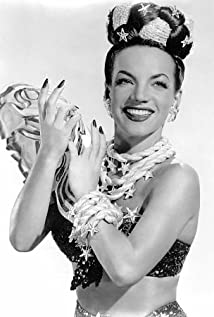Carmen Miranda was born Maria do Carmo Miranda da Cunha on February 9, 1909, near Porto, Portugal, in the town of Marco de Canavezes. Not long after her birth her family moved to Brazil, where her father was involved in the produce business. The family settled in the then-capital city of Rio de Janeiro. After leaving school, Carmen got a job at a l...
Show more »
Carmen Miranda was born Maria do Carmo Miranda da Cunha on February 9, 1909, near Porto, Portugal, in the town of Marco de Canavezes. Not long after her birth her family moved to Brazil, where her father was involved in the produce business. The family settled in the then-capital city of Rio de Janeiro. After leaving school, Carmen got a job at a local store, and often began singing on the job. Before long she was discovered and got a singing job on a local radio station. She ultimately got a recording contract with RCA. By 1928 she was a genuine superstar in Brazil. As with other popular singers of the era, she eventually made her way into the film world. She made her debut in the Brazilian documentary A Voz do Carnaval (1933). Two years later she appeared in her first feature film, Alô, Alô, Brasil (1935). However. it was Estudantes (1935) that seemed to solidify Carmen in the minds of the Brazilian movie audiences. Now they realized she could act as well as sing. Although there was three years between "Alo, Alo Carnaval" and Banana-da-Terra (1939), Carmen continued to churn out musical hits in Brazil. The latter film would be the last in her home country. In late 1939 Carmen arrived, with much fanfare in the press, in New York City. She was now ready to capture Americans' hearts with her talent. She appeared in some musical revues on Broadway and, just as everyone thought, was a huge hit. In 1940 Carmen was signed to appear in the Twentieth Century-Fox production Sous le ciel d'Argentine (1940), with Betty Grable and Don Ameche. The only complaint that critics had was the fact that Carmen was not on the screen enough. In 1941 she was, again, teamed with Ameche in addition to Alice Faye in Une nuit à Rio (1941). The film was extremely popular with the theater patrons. Her unique songs went a long way in making her popular. It was after Week-end à La Havane (1941) that American cartoon artists began to cash in on Carmen's ever-growing popularity. In the 1930s and 1940s cartoons were sometimes shown as a prelude to whatever feature film was showing. Sure enough, the cartoon version of Carmen came wriggling across the screen, complete with her trademark fruit hat and wide, toothy grin. In 1942 Carmen starred in Springtime in the Rockies (1942) with Betty Grable and Cesar Romero, both of whom she had worked with before. It was shortly after this that America began adopting her style of dress as the latest fad. 1944 saw her in three films: Something for the Boys (1944), Four Jills in a Jeep (1944) and Montmartre à New York (1944). The first two did well at the box-office, but the last one left a lot to be desired. It was her last busy year in film. Carmen made one film each in 1945, '46, '47 and '48. After that she didn't make a film for two years, until Voyage à Rio (1950), a production for MGM. Once again didn't make a film for several years, returning with Tu trembles carcasse (1953). She did stay busy, singing on the nightclub circuit and appearing on the relatively new medium of television. However, "Scared Stiff" was her final performance on the silver screen. On August 4, 1955, she suffered a heart attack, although she didn't realize it at the time, during a video taping of The Jimmy Durante Show (1954). She went home after attending a party. Early the next morning, on August 5, Carmen suffered a fatal heart attack. She was just 46 years old. Her body was flown to her adopted country of Brazil, where her death was declared a period of national mourning.
Show less «



